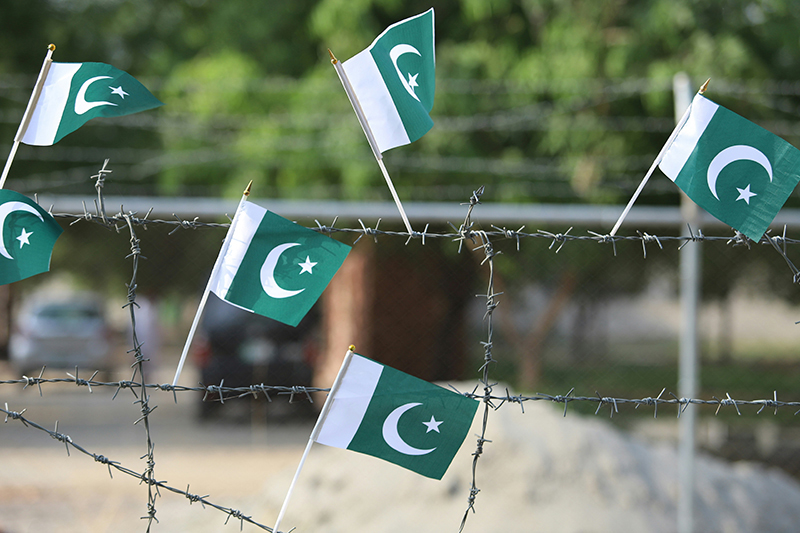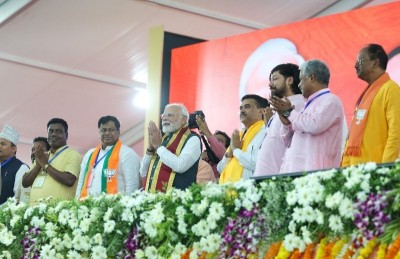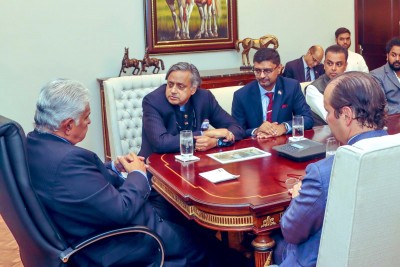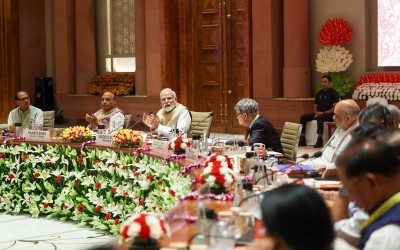 Pakistan
Pakistan
Pakistan elections: A split verdict despite accusations of mass rigging has made the military establishment more vulnerable
Pakistan’s delayed general elections that were held on 8 February have thrown up more questions than they have answered, and alarmingly for the country’s all-powerful military, most of the difficult questions are yet again directed pointedly towards it.
Amid nationwide protests over allegations of vote rigging and result manipulation after authorities switched off mobile phone networks on election day and the counting dragged on for more than two days, the Election Commission of Pakistan announced that independent candidates backed by jailed ex-Prime Minister Imran Khan’s Tehreek-e-Insaf (PTI) party had won the most seats at the national level, followed by another former Prime Minister Nawaz Sharif’s Pakistan Muslim League-Nawaz (PML-N), the Pakistan Peoples Party (PPP) and the Muttahida Qaumi Movement (MQM), in that order.
Pakistan’s polling watchdog, Free and Fair Election Network, noted that there was transparency at the polling stations, but the vote was compromised at the counting and tabulation stages. The result, and the PTI’s assertion of vote manipulation by “mandate thieves”, mean that a period of political uncertainty involving nationwide protests that could turn violent, which would in turn trigger a crackdown by the military, is likely to be in store for Pakistanis.
Reuters reported on 11 February that the final results of Pakistan’s national election had put independents, backed by Imran Khan, in the lead with 93 of 264 seats.
The PML-N won 75 seats and the PPP 54. Since then, even though the PTI has, with Imran Khan’s blessings, nominated party general secretary Omar Ayub as its candidate for Prime Minister, the PTI-backed candidates cannot form a government on their own as they had contested as independents, and not as a party.
Also, as the PTI is not recognized as a parliamentary party, it cannot get its share of about 70 reserved seats for women and religious minorities. Hence, the party would not be able to achieve a simple majority to form a government at the centre.
In this scenario, Nawaz Sharif’s younger brother Shehbaz looks set to take over as the Prime Minister, as the PML-N has agreed upon a coalition with the PPP, MQM, and others. Shocked by his party’s dismal showing, Nawaz Sharif, who was widely expected to take up the premier’s role, will now, as per the PML-N, “supervise” the federal and Punjab affairs of the party. Nawaz’s daughter Maryam Nawaz is set to become the new Chief Minister of Punjab province. Shehbaz has hinted that PPP leader Asif Ali Zardari could be the next President of Pakistan.
Husain Haqqani, a former Pakistani Ambassador to the US, believes that “The election result shows disenchantment of young Pakistanis with the military establishment and politics as usual”. According to Gallup, Pakistanis are deeply pessimistic about the country’s economic future and they also question the fairness of the electoral process — before the election, 7 in 10 Pakistanis said they lacked confidence in the honesty of the elections.
Writing in Dawn on 14 February, Pakistani author and commentator Zahid Hussain asserted that “It was perhaps the most consequential election in Pakistan’s recent history. Defying all odds, the voters turned out in record numbers. They have spoken out, loud and clear, and given their verdict.
It was a vote for hope and democracy. But the people’s mandate seems to have been stolen yet again. Events in the run-up to the elections had left little faith in the fairness of the polls. Still, the people came out, breaking down the walls of fear and hoping to bring change through the power of the ballot.
The massive turnout of youth and women voters made the difference. It was a protest vote against political repression and the status quo. Anti-establishment sentiment was quite palpable.
The voting trend and initial poll results from Punjab and KP indicated a total rout of parties seen as having the military’s backing, in particular the PML-N.
The PTI candidates took the lead in major constituencies. Yet the final tally showed an incredibly different result. Many of the PML-N heavyweights who were lagging far behind PTI-affiliated candidates till late night were declared the winners the next morning. How this amazing turnaround happened is anybody’s guess. However, it was a different story in KP, where the result could not be altered much. The PTI held its ground in its main bastion”.
Adding some historical context, Zahid Hussain continued, “It is certainly not for the first time that the country has witnessed such a mysterious overnight turnaround of poll results. We saw it, too, in the 2018 elections. It all depends on who is the favourite of the security establishment at the time.
There was no doubt that the PTI was the main beneficiary of the ‘hand of God’ in the previous election. But what happened this time has hardly any precedent. It was a protest vote against political repression and the status quo. The large-scale poll irregularities have drawn a strong international reaction.
The US, UK, and the European Union have separately expressed concerns about Pakistan’s electoral process and urged a probe into the reported irregularities. But the most damning statement on the elections came from the UN secretary general, who called on the Pakistani authorities and political leaders to resolve the issues related to the election ‘through the established legal frameworks’ and to refrain from taking any action that could raise tensions.
It is almost unprecedented for a UN official to make such remarks on an issue generally considered to be a country’s internal matter. These statements by the international community cannot be brushed aside. They clearly show the worsening global perception of Pakistan’s democratic process. It also brings into question the alleged involvement of the security establishment in manipulating the electoral process. Its footprints could be seen all over”.
Imran Khan, meanwhile, believes that the international community is not doing enough. PTI leader Asad Qaiser said that Khan had sent a message to the US in this regard. He said, “Khan has given a message that the US should raise its voice against the alleged rigging in elections.
He also gave a special message with regard to America that the US had not played their role accordingly. If they are champions of democracy, then they should voice it if they think the elections in Pakistan were not fair”. However, Pakistan’s Foreign Office spokesperson Mumtaz Zahra Baloch, responding to criticism from several countries, think tanks, and international media organizations, said that the elections were Pakistan’s internal affair. She added that “Pakistan takes its constitutional obligations seriously and its people are entitled to enjoy their right to freedom and democracy. Any step that Pakistan takes in this regard is in conformity with its own constitutional obligations and not influenced by external advice”.
Pakistan’s new government will be faced with several daunting challenges. The most important will be dealing with an economy that is still in the critical ward. Soaring inflation has fuelled a cost-of-living crisis, which has played into the election, with the PML-N’s inability to secure a majority partly attributable to its poor record in the government it led until last August. The next government will have to expeditiously negotiate a fresh, extended programme with the IMF as the stand-by arrangement will end in March. This is urgently needed for Pakistan to meet its heavy foreign debt liabilities – $25-$30 billion annually – in the years ahead. As Asfandyar Mir and Tamanna Salikuddin argued in an analysis in The United States Institute of Peace (USIP), “This will require the government to commit to a path of fiscal discipline, unpopular tax reforms, privatization of State-owned businesses, and withdrawal of energy subsidies, while also obtaining support from the United States, China and Gulf powers at the IMF. Negotiating such a program will be challenging for a coalition government led by Shehbaz Sharif. Not only will it have to forge consensus within the coalition on difficult policy adjustments required by the IMF, it may also have to do so amid a strong protest by the PTI”.
As Maleeha Lodhi, former Pakistani Ambassador to the US, the UK and the UN, reiterated in Dawn on 12 February, “a weak coalition government will dampen the prospects of wide-ranging economic reforms that Pakistan desperately needs to put it on the trajectory of sustainable growth and investment. If the next government is a minority one, dependent for survival on appeasing a motley group of parties, will it be able to take tough and politically painful decisions to extricate the country from the economic crisis? The fall in share prices on the stock market and weakening in Pakistan’s sovereign dollar bonds in the wake of the election reflected uncertainty about the prospects of political stability and meaningful economic reform”.
Lodhi also believes that the political challenge will be no less demanding. The government will face a numerically strong opposition in the National Assembly. That will make legislative work an onerous task apart from having to deal with what is expected to be a noisy parliament. Moreover, with the country so divided and polarization reinforced by the election, this too has implications for the incoming government. Further, “The next government will also have to deal with the challenge of establishing smooth and stable relations with the military which in recent years has acquired a much larger role in politics and governance, even in economic and investment matters. The state of civil-military relations could be a key factor that determines the longevity of the coalition arrangement”.
Omar Waraich, special adviser at the Open Society Foundations, believes that the recent vote “was an astonishing display of defiance”, and that “This was supposed to be the most predetermined election in Pakistani history. Instead, it became a peaceful revolt against the powerful military establishment… Young Pakistanis are clear that it is they, and not the men in uniforms, that will make decisions about their future”. Mir and Salikuddin of the USIP argued on 13 February that “Another way to read the outcome is that it is also a rejection of the military establishment’s role in politics, in particular its opposition to the PTI and the clampdown against the party since last year”. On the flip side, as Ishaan Tharoor, a foreign affairs columnist at The Washington Post, noted, “The country’s military authorities may be chastened by the vote. But they could also see the outcome as further grounds to tighten their hold on the reins of power”.
Professor Syed Munir Khasru reminded in his 14 February analysis in the South China Morning Post that “For decades, Pakistan’s military establishment has interfered with the democratic process of the country, influencing election outcomes to maintain its grip on power. While the public votes, the military ensures that only its preferred parties or leaders emerge victorious through various mechanisms. This managed political system has largely kept the transitions of power stable – but at the cost of establishing genuine representative governance. However, the recent ousting of former Prime Minister Imran Khan, once backed by the military, has disrupted this established process and created upheaval. Since Pakistan’s independence in 1947, the army has carried out three direct coups, in 1958, 1977 and 1999, when civilian governments lost the military’s favour. These overt seizures of power laid bare the reality of who truly rules the country. Even when not formally in power, the generals have exerted control over weak civilian governments through indirect means”.
In his book The Army and Democracy, Aqil Shah had observed that “In almost pendulum-like fashion, it appears the military has gone from governorship back to guardianship”. The military has justified its interventions by claiming to be saviors against corrupt civilians. However, as Khasru pointed out, the real motive has been to protect the military’s privileged position and massive business interests, estimated to be worth over $100 billion, or more than a quarter of Pakistan’s gross domestic product (GDP). He concluded, “Allowing civilian supremacy risks diminishing the military’s corporate interests and agenda, while continuing with a controlled democracy is also unsustainable, as evidenced by the mass support that populists like Khan can marshal. The generals have a choice – either recalibrate and let representative politics flourish or risk rebelling against an idea whose time has come”.
In the end, an election that most Pakistanis hoped would deliver political stability has ended up creating a host of uncertainties and issues of legitimacy, and the onus for initiating a process of reconciliation and healing must rest on the shoulders of the Pakistani military establishment that, in the first place, sowed the seeds of today’s divisions and polarization in Pakistani politics, as in society.
Support Our Journalism
We cannot do without you.. your contribution supports unbiased journalism
IBNS is not driven by any ism- not wokeism, not racism, not skewed secularism, not hyper right-wing or left liberal ideals, nor by any hardline religious beliefs or hyper nationalism. We want to serve you good old objective news, as they are. We do not judge or preach. We let people decide for themselves. We only try to present factual and well-sourced news.







